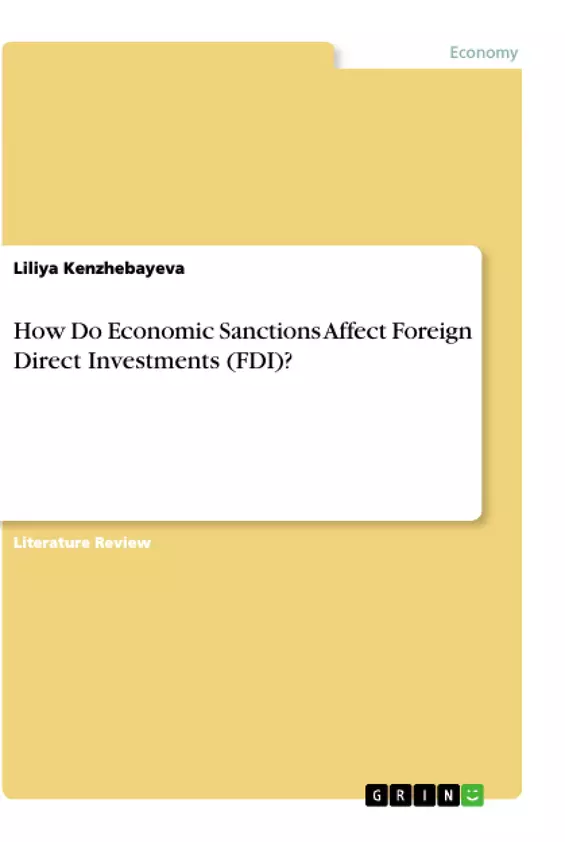There are intense debates around effectiveness of economic sanctions in political economy. Sanctioned governments are being under pressure of travel bans, financial restrictions, military coercion, surviving in a difficult economic situations and being forced to change policies and seek compromises. It is well studied that economic coercions have a negative effects on target states economies, especially with military interventions. But what is the effect of sanctions for countries which impose those sanctions having FDI inflow in targeted economies?
The main question of all collected articles is relationship between economic sanctions and foreign direct investment (FDI). The objective is to highlight how FDI has been negatively or positively affected in targeted countries and how investors benefit from FDI. All articles used literature reviews and empirical analyses based on time-series cross-national data.
The critical analysis of the study will be divided into 3 categories: 1. Unilateral and bilateral sanctions which describe relations between a sender and a target 2. The role of third-party countries in terms of cooperation as allies or rivals who undertake the dominant position of a sender 3. Important aspects when sanctions are effective to be imposed such as aspect of time (short or long-run), a degree of economic pain (military or economic coercion), entry mode (through multilateral corporations or join ventures), competitiveness of firms and the value of exchange rate.
Inhaltsverzeichnis (Table of Contents)
- Introduction
- 1. A sender vs. a targeted country. Loss or benefits?
- 2. Third-party countries. Allies or competitors?
- 3. Important aspects of effectiveness of sanctions.
Zielsetzung und Themenschwerpunkte (Objectives and Key Themes)
This collection of articles examines the relationship between economic sanctions and foreign direct investment (FDI). The main objective is to understand how sanctions impact FDI flows in targeted countries and the benefits for investors. The articles utilize literature reviews and empirical analyses based on time-series cross-national data.
- The impact of sanctions on FDI flows in targeted countries.
- The role of third-party countries in influencing FDI decisions.
- The effectiveness of sanctions in achieving their intended objectives.
- The potential for sanctions to create business opportunities for investors.
- The importance of considering both short-term and long-term effects of sanctions.
Zusammenfassung der Kapitel (Chapter Summaries)
- Introduction: This section introduces the research question and the objectives of the study. It discusses the potential effects of sanctions on FDI flows and highlights the use of empirical analyses based on time-series cross-national data.
- 1. A sender vs. a targeted country. Loss or benefits?: This chapter examines the impact of sanctions on FDI from the perspective of the sender and targeted countries. It explores how sanctions can create business opportunities for multinational corporations and how investors might benefit from the resulting economic instability.
- 2. Third-party countries. Allies or competitors?: This chapter focuses on the role of third-party countries in the context of economic sanctions. It analyzes how these countries can benefit from FDI disinvestment from the targeted country and the potential for sanctions to create business opportunities for them. The chapter also discusses the challenges of enforcing extraterritorial sanctions and the need for international cooperation.
- 3. Important aspects of effectiveness of sanctions.: This chapter explores the impact of time on the effectiveness of sanctions and how short-term effects might differ from long-term consequences. The authors present a theoretical model to illustrate the complex relationship between sanctions and FDI flows over time.
Schlüsselwörter (Keywords)
This collection of articles focuses on the relationship between economic sanctions and foreign direct investment (FDI), exploring the impact of sanctions on FDI flows, the role of third-party countries, and the effectiveness of sanctions in achieving their objectives. Key themes include: extraterritorial sanctions, political risk, business opportunities, sanctions busting, and the importance of considering both short-term and long-term effects.
Frequently Asked Questions
How do economic sanctions impact Foreign Direct Investment (FDI)?
Generally, sanctions have a negative impact on FDI flows to targeted countries due to increased political risk and economic instability, though some investors may find unique opportunities.
What is the role of third-party countries during sanctions?
Third-party countries can act as allies by joining the sanctions or as rivals/competitors who take over the market position of the sender country through "sanctions busting."
Do investors ever benefit from sanctions?
In some cases, multinational corporations may benefit from reduced competition or favorable exchange rates in a sanctioned economy, provided they can navigate the legal restrictions.
What factors determine the effectiveness of sanctions?
Key factors include the duration of the sanctions (short vs. long-run), the degree of economic pain inflicted, and whether the sanctions are unilateral or multilateral.
How does political risk influence FDI disinvestment?
Sanctions significantly increase political risk, leading many foreign investors to withdraw capital (disinvest) to avoid legal penalties and financial losses.
- Citation du texte
- Liliya Kenzhebayeva (Auteur), 2020, How Do Economic Sanctions Affect Foreign Direct Investments (FDI)?, Munich, GRIN Verlag, https://www.grin.com/document/907119



